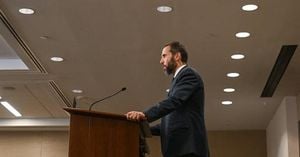Friedrich Merz, the leader of Germany’s Christian Democratic Union (CDU), has found himself at the center of intense criticism following his controversial migration policy initiative. A recent attempt to pass the 'Zustrombegrenzungsgesetz'—a law aimed at tightening asylum regulations—was met with significant backlash from both political opponents and the public.
On January 31, 2025, the Bundestag voted on this bill, which was bolstered by support from the far-right Alternative for Germany (AfD). This marked the first time the CDU had sought majorities with the AfD’s assistance, aiming to radically alter immigration controls. With the failure of the legislation following heated debates, many are questioning Merz's judgment and leadership.
The tumultuous events leading up to the vote included nationwide protests, with approximately 1,500 demonstrators assembling outside Merz's appearance at a CDU campaign event in Erfurt. Protesters shouted slogans such as "Shame on you!" and "Steigbügelhalter"—a term denoting someone facilitating another's rise, with strong disdain aimed at Merz's alignment with the AfD.
Critics argue this alignment has dangerously blurred lines for the CDU and threatens the party's historical commitment to democratic principles. A vocal spokesperson at the protest stated, "Jena must be 'light city' and not 'Dark Germany'"—a sentiment reflecting the public's frustration with the perceived drift to the right within German politics.
Prior to the failed vote, the CDU had pushed for the adoption of stricter asylum laws, which included provisions for limiting family reunification for beneficiaries of subsidiary protection and granting the federal police greater authority to detain those required to leave the country. Achim Post, the chairman of the North Rhine-Westphalia SPD, expressed grave concerns, stating, "This marks an unprecedented turning point in the history of post-war Germany… Friedrich Merz has consciously breached the firewall against the AfD." This generational shift signals both the collapse of the traditional political center and the potential normalization of extreme views within mainstream discourse.
Chancellor Olaf Scholz articulated the gravity of the situation following the failed legislative effort. He stated, "Merz has overplayed his hand. But more critically, he has gambled with the democratic fabric of our society." Scholz criticized Merz for resorting to the AfD for votes, asserting it contradicted the need for unity among democratic parties, especially during moments of national distress. Referencing the tragic knife attack in Ashaffenburg, he emphasized the importance of collaborative governance and the urgent need to unite rather than divide.
Indeed, the Bundestag's session prior to the vote was fraught with tension, reflecting not only the stakes of this specific legislation but also broader anxieties concerning Germany's political future. The meeting, delayed for three hours, was filled with disputes as parties vied for their positions on national security and social responsibility.
The backlash extended beyond just parliamentary discourse. The protest movement gained momentum, with organized rallies expressing disappointment over the CDU’s apparent willingness to adopt right-wing strategies. Demonstrators accused Merz of compromising the CDU's integrity, shouting at the CDU event about his alleged servitude to far-right ideologies. Similar protests unfolded across other cities, displaying solidarity against the rightward shift seen within the CDU.
Following these events, political responses were swift and significant. Sarah Philipp, also of the SPD, stated, "The Union’s insistence on pushing through this law, with constitutional and European legal concerns hanging over it, demonstrates extreme judgment failure. After all this, people will now clearly see: only with Olaf Scholz and the SPD can voters be assured of avoiding alliance with the AfD."
The situation has ignited discussions about the future of German democracy. With accusations flying and tensions high, many are left contemplating whether Merz's move was merely political posturing or if it signals a more dangerous precedent for the CDU moving forward. The 'Zustrombegrenzungsgesetz' may have been defeated, but the questions raised about the collaboration with the AfD linger ominously.
Friedrich Merz’s political fortune now hangs precariously as public sentiment continues to shift. The protests, highlighting the discontent among the populace, serve as a stark reminder of the responsibility politicians hold to navigate complex societal issues without compromising democratic principles. History, it appears, is being shaped by these very confrontations, inviting future scrutiny of how leaders align and represent their party’s values.



